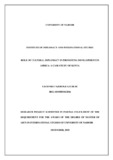| dc.description.abstract | Cultural diplomacy has not been given as much academic consideration as it should be regardless of the late development in grant of the different schools of International Relations Theory. This study contends that cultural diplomacy is crucial for Africa and African countries, particularly Kenya. Given that Kenya is a key player in the African economy; its foreign policies are instrumental in its diplomatic relations. This study attempts to address this by studying the role and impact of cultural diplomacy in promoting development in Kenya. The general objective of the study is to demonstrate the role and impact of cultural diplomacy in promoting development in Africa a case study of Kenya. The study is guided by the following research objectives; to examine the role and impact of cultural diplomacy in promoting development in Africa, to assess the role and impact of cultural diplomacy as a tool for advancing development in Kenya, and to establish the mechanisms of cultural diplomacy and what has been their impact in achieving development in Kenya. Soft Power Theory is employed in the underpinnings of the study. The research utilizes a descriptive approach with the study sample being 102 respondents who constituted of ambassadors, envoys, sports personalities, athletes, Ministry of Foreign Affairs concerned officials, and cultural diplomats among other stakeholders. This studies uses primary data and questionnaires as a method of data collection. The analysis is done by way of frequencies and percentages, mean, and standard deviations, which constitutes of descriptive statistics and is presented using charts, figures, and tables. The findings indicated that cultural diplomacy can indeed be applied to advance development as indicated by majority of the respondents. The findings also revealed
that cultural diplomacy can be used as a tool to promote development as indicated by majority of the respondents. The findings indicate that the various mechanisms for cultural diplomacy included; leveraging athletics and sports, gifting and marketing of Kenyan cultural products, promotion of cultural heritage through tourism, identification and appointment of cultural aambassadors, and promotion of Kiswahili as a national language. It can be concluded that cultural diplomacy can indeed be applied to advance development, and can be used as a tool to promote development in Kenya. In addition, the diverse mechanisms of cultural diplomacy w are important in promoting development interests in Kenya. The researcher recommends that Ggovernment Ministry offices mandated to deal with issues on cultural diplomacy, and embassies should make use of these research findings in assessing how better to coordinate and collaborate in efforts to come up with well-articulated policies and strategic plan, resource allocation, and mechanisms in the conduct of their business to promote international image and thus foster development. Policymakers should use the findings of this study in coming up with better and robust policies to enhance the cultural diplomacy and ensure better development in the country. Most respondents indicated that the mechanisms for cultural diplomacy were not well coordinated. | en_US |



